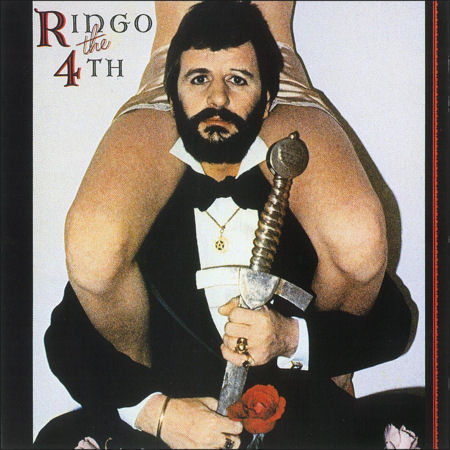
Ringo the 4th (1977)

1. Drowning in the Sea of Love 2. Tango All Night 3. Wings 4. Gave it All Up 5. Out in the Streets 6. Can She Do it Like She Dances 7. Sneakin' Sally Through the Alley 8. It's No Secret 9. Gypsies in Flight 10.Simple Love Song
By the time Ringo the 4th surfaced in 1977, it had become fairly evident that Ringo Starr’s well of inspiration was not so much running dry as it was being frantically ladled from by those with questionable taste in late-'70s musical trends. Though technically his sixth solo effort, it was only the fourth to offer (mostly) new and original material. And therein lies the paradox: the most interesting thing about this record is its title—a vague joke referencing royalty, perhaps, but one suspects the Roman numeral would’ve gone down easier had the music not been so tone-deaf.
There’s no avoiding it: this is “Disco Ringo.” And like most misadventures in fashionably late bandwagon-jumping, it fails not for lack of commitment, but for lack of conviction. Disco, for all its excesses, at least demanded polish and panache. Ringo, bless him, brings neither. The grooves are limp, the vocals strained, and the production smothered in synthetic sheen. One almost envisions a glitterball descending from the studio ceiling every time the tape rolled.
Strangely, this is one genre where a few well-chosen covers might have helped steer the ship toward safer waters. But no—most of the material here is original, and many of the tracks are co-written by Ringo himself. The title may imply authority, but the content says otherwise. Gave It All Up, a stab at introspective balladry, tries to pivot into childhood nostalgia, but comes across more like a diary entry that should’ve remained private. It’s No Secret fares better—there’s a gentle melancholy beneath the gloss, and had it been delivered with a bit more restraint (and a bit less synthetic warbling), it might’ve passed for poignant.
The rest is largely indistinct—background music for a party no one stayed at. The disco fixation is unrelenting, and not in a good way. One imagines even the studio technicians eventually giving up and leaning on the default setting for every instrument: “approximate Bee Gees.”
And yet, one hesitates to be too cruel. Ringo, after all, has always occupied a peculiar place in rock history: the affable also-ran, the one you couldn’t quite take seriously even when he was trying to be sincere. So when a record like this lands with a thud, the instinct isn’t outrage so much as pity. The public didn’t embrace it then, and time has certainly not improved its reputation. The most lasting result of Ringo the 4th was his swift dismissal from the label that released it—a development that feels, in retrospect, more like mercy than punishment.